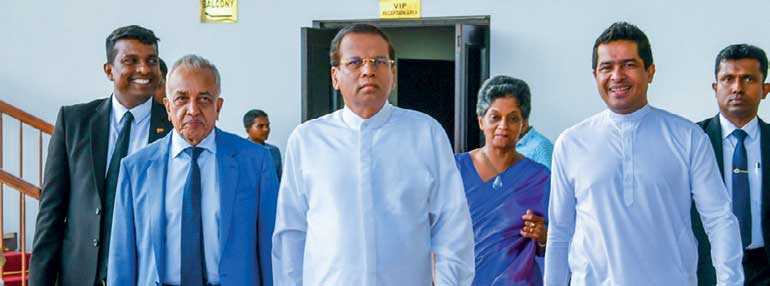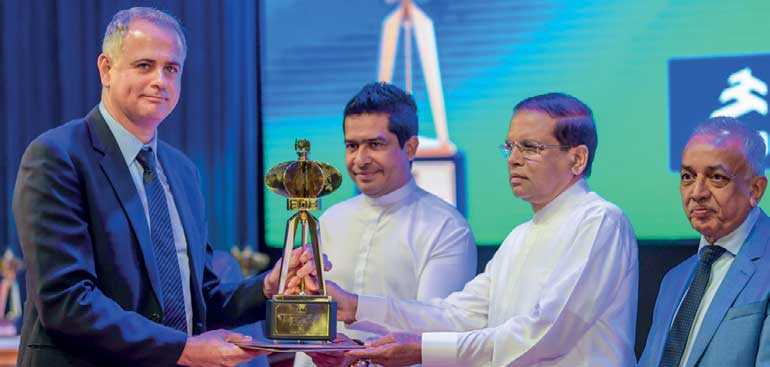Sunday Feb 22, 2026
Sunday Feb 22, 2026
Thursday, 20 September 2018 01:29 - - {{hitsCtrl.values.hits}}

Development Strategies and International Trade Minister Malik Samarawickrama with Chief Guest President Maithripala Sirisena at the Presidential Export Awards ceremony on Monday

Following is the address by Minister Malik Samarawickrama at the Presidential Export Awardson 18 September
His Excellency President Maithripala Sirisena, Hon. Ministers, Your Excellencies and Members of Diplomatic Missions, Secretary, Ministry of Development Strategies and International Trade, Chairperson and Chief Executive, EDB, distinguished invitees, good afternoon ladies and gentlemen.
It gives me great pleasure to address you today, at this prestigious award ceremony organised by Sri Lanka Export Development Board, as we recogniseour country’s top exporters who are generating much-needed foreign exchange and generating thousands of good jobs for our people. Congratulations to all of the winners today and my Congratulations to all exporters!
Firstly, let me thank His Excellency the President for being present at this year’s awards ceremony, which shows the importance he places on exports in this country.
We should all be very happy that we had a record year for exports in 2017, achieving 15.15 billion US Dollars in merchandise and services exports. We are on track to achieve the target of 17.2billion in total exports for 2018. This shows that our exports have increased by 50% over the past three years. This shift towards a more export-oriented economy, after years of being too domestic-economy focused, is an important move in the right direction – in the direction of a more dynamic and private sector-oriented growth model.
Yet, we should not be satisfied with this, when we see our peer countries doing 10-15 times more than us. To put it in context, Singapore’s exports are 480 billion US Dollars, Taiwan is 340 billion US Dollars, Thailand is 254 billion US Dollars, and Vietnam is 250 billion US Dollars. I was in Vietnam last week, attending the World Economic Forum on ASEAN, and I witnessed first-hand the kind of prosperity, economic growth, and job creation that Vietnam is experiencing as a result of its strong export-oriented strategy. Vietnam is one of the few countries in the world where the export value is higher than the country’s GDP. Being more and more export-oriented, through private sector friendly economic policies and strategies to boost competitiveness, is the only way for Sri Lanka. And our Government is committed to pursuing this policy path, anchored to the ‘Vision 2025’.
Policy reforms
The Opposition, as well as a few professional associations,keep unfairly criticising our Government, while we have embarked on a range of policy reforms over the last three years. For the first time we introduced an anti-dumping law to protect our domestic industries from unfair competition from abroad. For 15 years previous regimes had been struggling to get this Act passed in Parliament.
We introduced a National Export Strategy and a National Quality Infrastructure Strategy to help domestic firms to diversify our product base and compete with the rest of the world. We are soon bringing out the Innovation and Entrepreneurship Strategy to foster a climate for new high-tech products and services to emerge and also for startups to thrive. These initiatives will benefit the current exporters and will benefit emerging and aspiring exporters among our domestic enterprises.
I want to thank the private sector who positively contributed to these efforts – all these three new strategies were co-chaired by the private sector and developed closely with their partnership.
Trade liberalisation effort
Guided by the National Trade Policy, the trade liberalisation effort is also underway, to bring down para-tariffs and tariffs of imported inputs that are so vital for our exporters to be part of global supply chains. And for those enterprises that will face short term challenges due to trade liberalisation, we are about to introduce a ‘Trade Adjustment Programme’.
In the true spirit of transparency and stakeholder consultation, we opened up the draft of this ‘T-A-P’ document for public comments online and used that feedback to refine the document. The Cabinet of Ministers approved the Programme and action is being taken to implement it.
The ‘Market Access Support Programme’ launched by the EDB has already received hundreds of applications, and we have already granted assistance to dozens of companies to help them with their overseas expansion.
Although under the GSP+ we have around 6,000 items open to us, we keep sending a handful of few products lines. We must diversify this by looking at what the markets want, what products are required, and catering cleverly to this. Under the ‘Market Access Support Programme’, if you want to do a market study to provide you the market intelligence, we can grant funds to support that.
The next window under this will be the ‘Enterprise Innovation Programme’ to support transformative innovation to diversify our product basket – it will be launched by next month. Through the ‘Enterprise Sri Lanka’ loan schemes, enterprises can get highly concessionary financing to fund expansion, technology upgrading, and win new export orders. And through the EDB’s‘2000 Exporter Programme’ – we are going district by district – finding and fostering a whole new cohort of potential exporters, to make this trade-led growth more inclusive than ever before. Our vision is for every enterprise to aspire to export and giving them assistance to make that aspiration come true.
It is important to concentrate on attracting FDI into the tradable sector. Most FDI over the past few years has been in non-tradable activities, and this has not resulted in rapid growth. Our focus now is on changing this. We have an investment promotion drive in Germany next week, and this will be followed by visits to Shanghai and Mumbai soon. Our mission to Japan earlier this year has already generated many strong leads which we are now pursuing.
To expand exports and increase FDI, we need to improve ease of doing business – andwe sincerely hope that – Governmentofficials will assist us in this. Exports is now everyone’s business, and across Government we must see that commitment.
Free Trade Agreements
Through the suite of FTAs that we are entering into we are opening up new markets for our entrepreneurs, and helping them plug in to global value chains. The FTAs are being done after many rounds of consultations and expert deliberations. Despite what you may read in the media, most of the people are on board, the trade chambers are on board. It is only a handful of selfish individuals who are opposing it.
The benefit of FTAs in attracting foreign investment cannot be underestimated –the investment protection through the FTAs is essential and we are already seeing this playing out following the Singapore FTA – around 16 billion US Dollars of investment proposals from Singapore have been received by us over the past few months.
This is the only way to go forward if we are to bring prosperity to our people. None of these things had been looked into by the previous regime and that is why our GDP growth hit a ‘ceiling’ after the immediate post war ‘growth bump’. For your information, Vietnam has already signed 17 FTAs and are currently negotiating four more.
Today’s winners
Today’s award winners are not winners because they were sheltered by protectionist walls – they are winners because they competed on a global stage and showed what Sri Lankan companies can do. All the people who are being awarded today are not people who have done deals and made money – gettinginfrastructure projects at inflated costs by bribing politicians and officials of the previous Government. The winners today have been productive, been innovative, and created high-paying jobs.
The winners today and all other exporters have substantially contributed to the growth of our economy, even during difficult times, and for that they must be applauded. We really appreciate the contribution they make to our economy.Our Government will do everything possible to encourage you to do better and to grow.
Tackling constraints
We are aware that one of the constraints you are facing is the dearth of workers and as a result you are finding it difficult to expand your business. Representations have been made to us to find a solution. We will discuss this at the highest level and come back with a solution in a short time. I intend to discuss with H.E. the President and Prime Minister and find a solution soon.
Countries like Singapore, Malaysia, Thailand, etc., have taken a pragmatic approach to this issue, and we must do the same. We should not miss getting know how from any part of the world. This is the same way that apparel industry grew –we shouldn’t be afraid to get know how from anywhere – toadd to our existing talent, to complement it. This is also important for the IT-related services sector. This sector has the potential to generate hundreds of thousands of the kind of jobs that our young people are aspiring to. And we need to marry our talent and competencies with targeted talent from abroad. We are also supporting the universities to turn out more engineering and IT graduates.
We recognised the issue that exporters faced with the new tax law, and now the Finance Ministry has agreed that even if you export a small volume you will pay the lower tax rate on the profits made from what you export. This will encourage even the smallest enterprise to export. And we know that through digital and e-commerce, there are new opportunities for anyone to start small and grow their exports. we also encourage the larger exporters to link up more strongly with SMEs - forging backward linkages and pulling up smaller exporters with them.
We also recognised the shortage of industrial land – since2002 no new export zones have been set up. Which is why we are now setting uptwo new zones –one in Milleniya and the other in Bingiriya. These will be completed within the next year. We are looking at a model where the private sector will be able to attract investors and operate the zones - under a PPP model with the BOI.
These are just some of what has been initiated over the last three years. Some of the results of these will take time, but we have laid the foundation. Those who are criticising us had not done anything along these lines. I sincerely thank His Excellency the President for encouraging us on all of these initiatives and wish to thank His Excellency for his positive and constructive observations and advice on these issues.
Government commitment
In concluding, let me once again reiterate our Government’s commitment to supporting the growth of exports, fostering globally competitive enterprises, and shaping a more private-sector and trade-oriented economy. Young people of our country see what’s going on in the world around them and will get fed up of the whole system if things don’t change.
Last week, at the ASEAN summit, I was blown away by the speed of change and progress in ASEAN – it is almost scary, because we are so far behind. But I am confident we can turn this around – if we work together in earnest. As leaders in Government it is up to us to take the difficult decisions. We have to reshape things for our young generation and their future.
Once again, my heartiest congratulations to today’s winners – for their determination and courage, and I wish them continued success in the world of exports and making Sri Lanka proud!
My sincere thanks to Chairperson of EDB Indra Malwatte and her staff and Secretary of my ministry Chandani Wijewardene, Secretary to my State Ministry and the officials of the Ministry. Finally I would like to thank State Minister Sujeewa Senasinghe for his efforts and assistance in promoting exports.